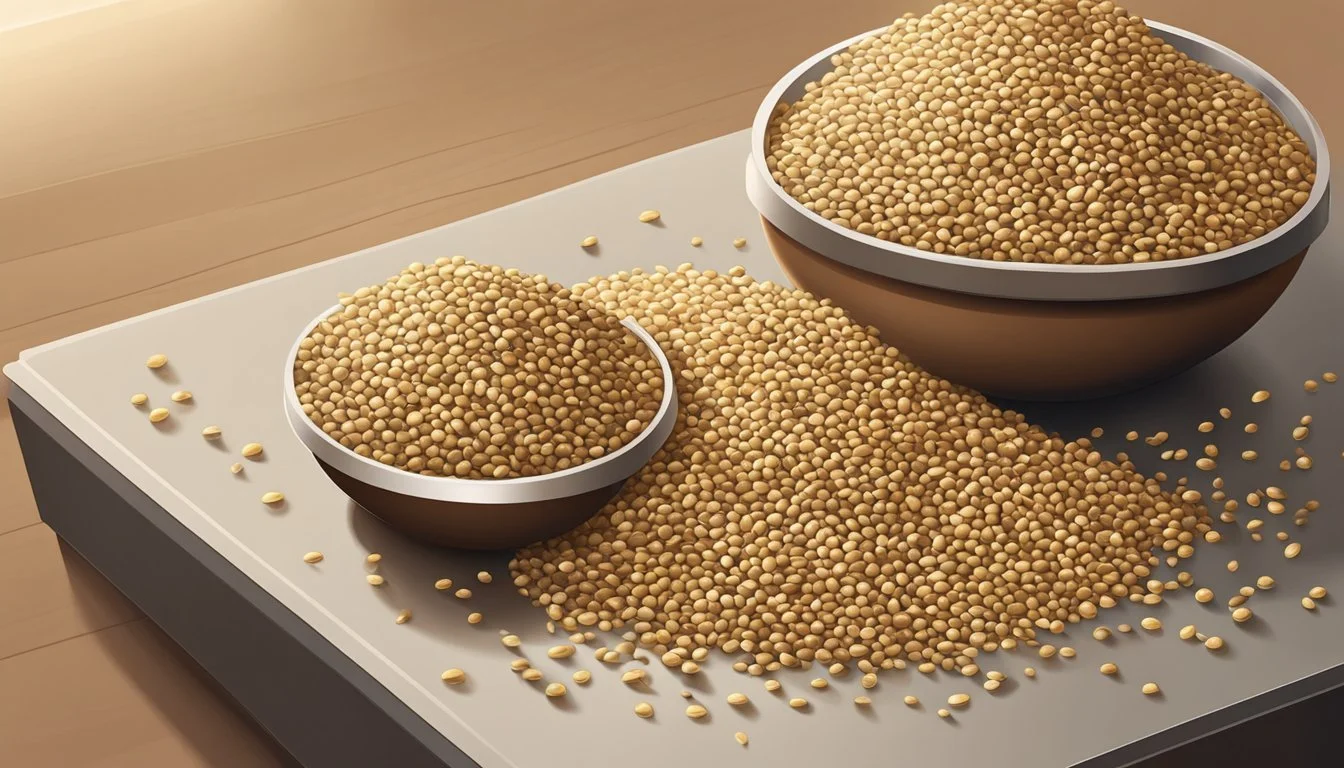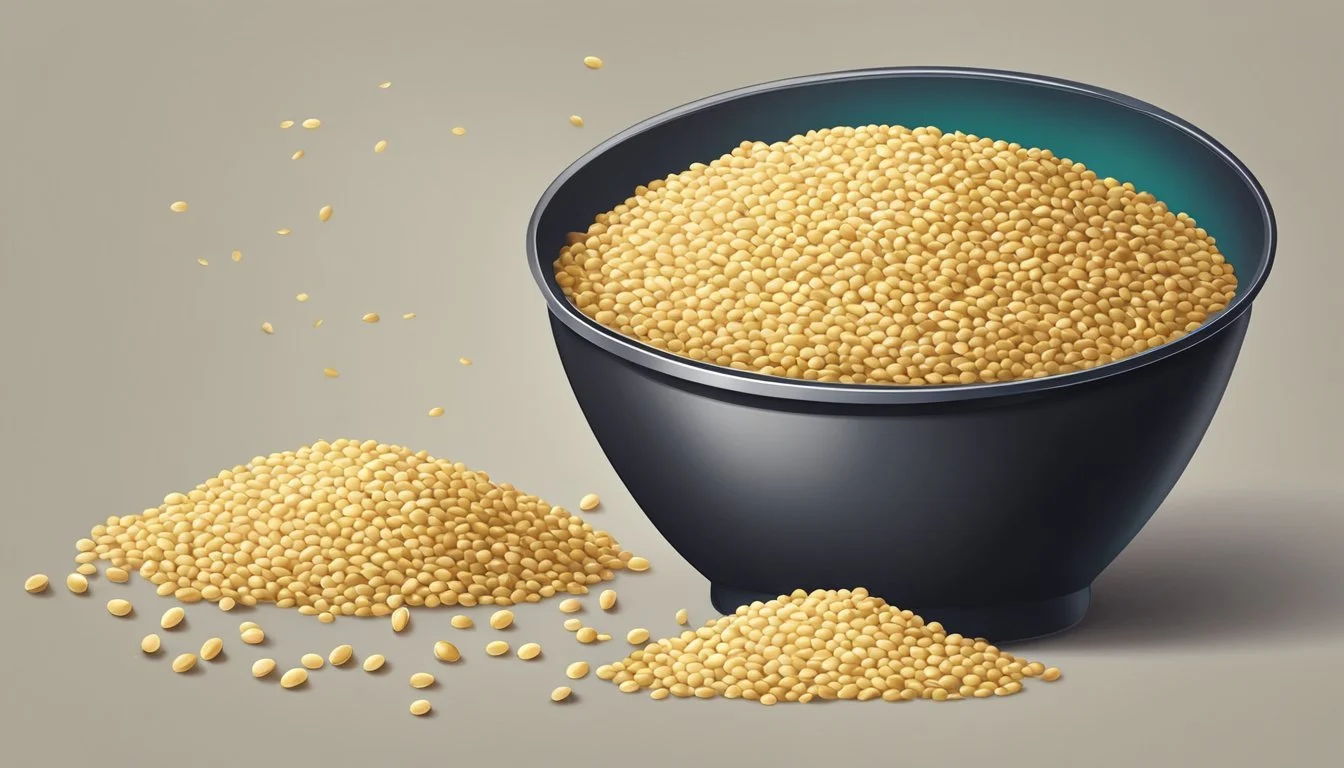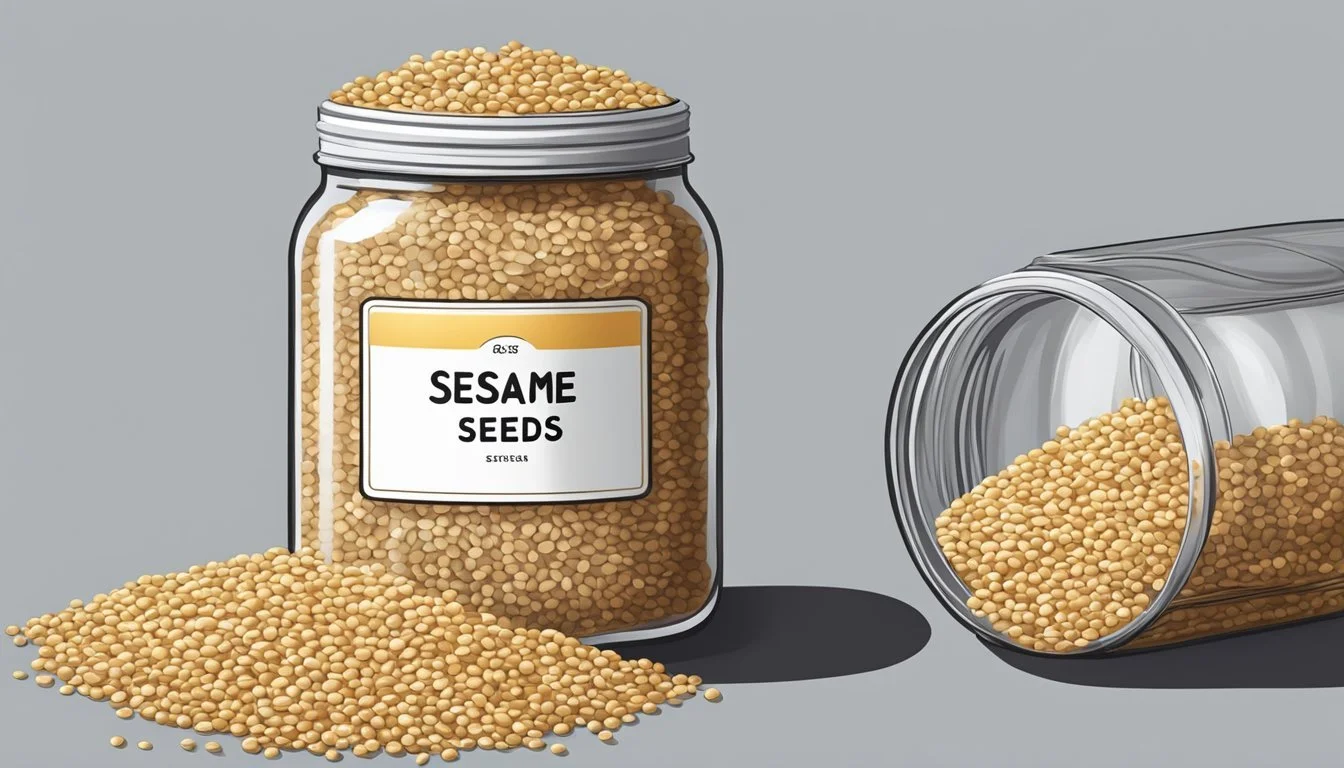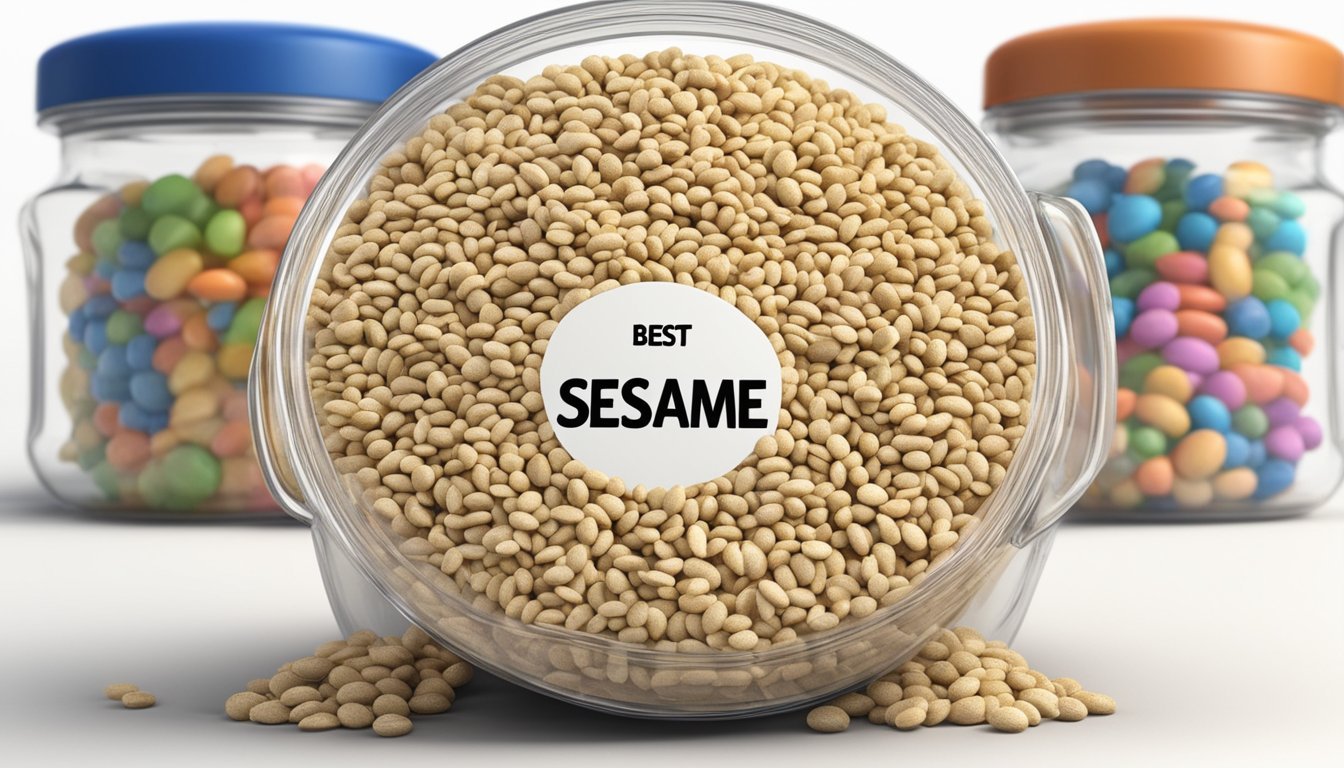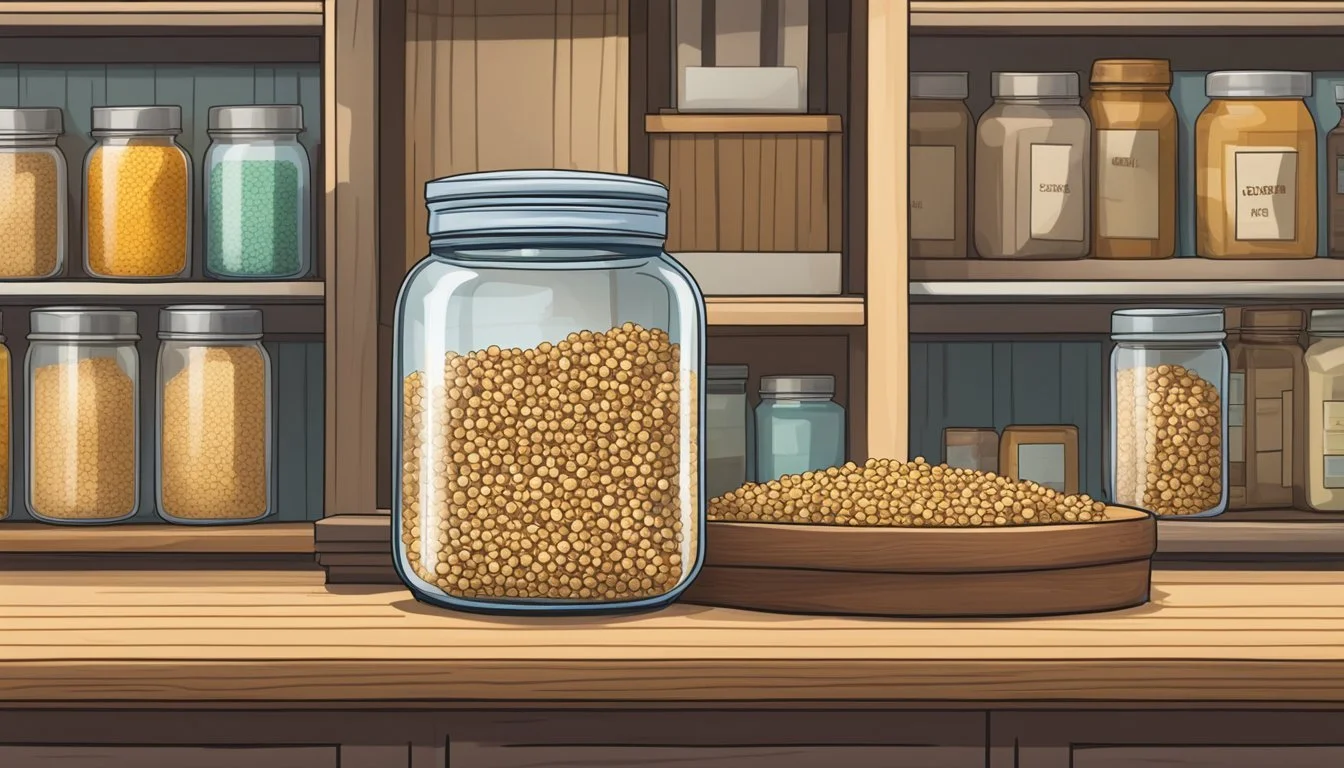Does Sesame Seeds Go Bad?
Shelf Life and Storage Tips
Do sesame seeds go bad? Yes, sesame seeds can go bad if not stored properly. The shelf life of sesame seeds depends on various factors such as whether they are raw or roasted, and how they are stored.
To maintain the quality and freshness of sesame seeds, it is essential to store them in an airtight container away from light and heat. Roasted sesame seeds typically have a shorter shelf life compared to raw seeds.
Proper storage can help extend the shelf life of sesame seeds, but it's crucial to check for signs of spoilage such as an off smell or taste before using them. This ensures the seeds remain a nutritious and tasty addition to your diet.
Understanding Sesame Seeds
Sesame seeds are small, nutrient-rich seeds used in various culinary applications. They can be found in different forms and contribute essential nutrients like protein and healthy fats.
Types of Sesame Seeds
Sesame seeds come in hulled and unhulled varieties. Hulled seeds have the outer shell removed, giving them a lighter color and milder taste. Unhulled seeds retain their shell, offering a slightly bitter flavor and higher calcium content. Additionally, sesame seeds can be found raw or roasted. Roasted sesame seeds have a more pronounced nutty flavor, making them ideal for garnishing dishes and adding depth to recipes.
Nutritional Content
Rich in protein and healthy fats, sesame seeds also contain significant amounts of vitamins and minerals. They are particularly noted for their high calcium and magnesium levels. Sesame seeds are a good source of antioxidants like sesamin, which can help reduce oxidative stress. These small seeds also provide important nutrients like zinc, iron, and fiber, contributing to a balanced diet.
Culinary Uses
Sesame seeds are versatile in the kitchen. They are often sprinkled on salads, breads, and stir-fries for added texture and flavor. Tahini, a paste made from ground sesame seeds, is a key ingredient in hummus and other Middle Eastern dishes. In baking, sesame seeds can enhance the flavor and appearance of goods like bread and cookies. Their nutty flavor pairs well with various savory and sweet recipes.
Storing Sesame Seeds
To ensure sesame seeds maintain their best quality, it is critical to pay attention to their storage conditions, proper sealing, and differences in shelf life based on storage methods. Correct storage can significantly extend the usability of sesame seeds.
Ideal Storage Conditions
Sesame seeds should be stored in a cool, dark, and dry place. Exposure to direct heat or sunlight can lead to the oils in the seeds oxidizing, causing them to go rancid. It's recommended to keep them away from light sources such as windows and heating appliances. The most suitable places for storage are pantry shelves, cupboards, or cabinets that remain consistently cool and dark throughout the year.
Proper Sealing and Containers
Using the right containers can make a significant difference in preserving sesame seeds. Airtight containers are essential to prevent moisture and air from getting in. This can include glass jars with tight-fitting lids, plastic containers, or even freezer bags for extra protection. Unopened packages should remain sealed until they are ready for use to avoid premature exposure to air, which can speed up the spoilage process.
Shelf Life Differences
The shelf life of sesame seeds varies based on how they are stored and whether the package is opened or unopened. Unopened sesame seeds can last for up to two years when stored properly. Once opened, sesame seeds have different durations depending on the storage location:
Pantry: 3 to 6 months
Refrigerator: Up to 1 year
Freezer: 6 months
By paying attention to expiration dates and best by dates, one can better judge freshness and quality. Properly stored sesame seeds maintain their nutritional value and flavor much longer, ensuring optimal use in various culinary applications.
Identifying Spoiled Sesame Seeds
Proper detection methods are essential to ensure sesame seeds remain safe to consume. Spoiled seeds can exhibit various signs, which, if overlooked, may pose significant health risks.
Signs of Spoilage
Sesame seeds can spoil over time, especially without proper storage. One primary indicator is a change in odor. Rancid smells or other off odors typically signal that the seeds have gone bad. Taste testing is another reliable method—spoiled seeds often have a rancid or sour taste. Visual cues include discoloration or the presence of mold. Fresh sesame seeds should be dry; stickiness or gumminess suggests moisture damage.
Odor Check: Rancid or sour smell
Taste Test: Sour or bitter taste
Visual Examination: Discolored, moldy, sticky seeds
Health Risks
Consuming expired sesame seeds can lead to digestive issues. Rancid seeds may harbor harmful bacteria that cause stomach discomfort or more severe health problems. Moldy seeds, in particular, can contain toxins. Allergic reactions might also ensue for those sensitive to spoiled seeds. It's crucial to recognize the risks associated with eating spoiled seeds to avoid adverse health effects.
Digestive Concerns: Upset stomach, nausea
Bacterial Risks: Potential for harmful bacteria growth
Allergies: Possible allergic reactions in sensitive individuals
Maximizing Sesame Seed Shelf Life
Proper storage techniques can significantly extend the shelf life of sesame seeds, ensuring they remain fresh and nutritious. Key methods include freezing, maintaining appropriate storage conditions, and deciding when to toast or roast the seeds.
Freezing Techniques
Freezing sesame seeds can prolong their freshness for several months. When freezing, place the seeds in an airtight container or a freezer bag. This method helps to protect them from moisture and other contaminants.
Label the containers with the date to track how long they have been stored. Keeping them at a consistently low temperature in the freezer minimizes the risk of spoilage, preserving both flavor and nutritional benefits.
Tips for Prolonging Freshness
Storing sesame seeds in a cool, dark, and dry place can significantly extend their life. Use airtight containers to keep out moisture and pests. Avoid refrigeration, as it can introduce moisture, potentially leading to deterioration.
For raw sesame seeds, consider storing them in the pantry or cupboard. Roasted sesame seeds have a shorter shelf life and should be consumed within three to six months when stored properly. Always check for signs of spoiling, such as changes in smell or taste.
When to Toast or Roast
Toasting or roasting sesame seeds enhances their flavor but impacts shelf life. Toasted seeds develop a richer taste but should be used more quickly. Roasting can slightly extend shelf life compared to toasting but still requires careful storage.
For the best results, roast sesame seeds just before use. Store any extras in an airtight container in a cool, dark place to maintain their freshness. This ensures the flavors remain robust, and the seeds do not become rancid.
Following these guidelines will help maintain the quality and taste of sesame seeds while extending their usability.
Frequently Encountered Issues
Proper storage and handling are essential to extending the shelf life of sesame seeds. Key issues such as contaminants, pests, moisture, rancidity, odors, and staleness can affect the quality and safety of sesame seeds.
Contaminants and Pests
Contaminants, including dust, dirt, and pantry pests, can infiltrate sesame seeds, especially if they are not kept in airtight containers. Pantry pests like weevils and moths are common culprits. To prevent contamination, store sesame seeds in airtight containers in a cool, dark place. Refrigeration is also a good option. Regularly inspect the seeds for any signs of pests or foreign materials.
Managing Excessive Moisture
Excessive moisture is a primary concern for sesame seeds, as it can lead to mold and spoilage. Moist environments can cause the seeds to clump together or develop a slimy texture. Always store sesame seeds in an airtight container to keep moisture at bay. Monitor the storage conditions, avoiding areas that are prone to humidity. Ensuring the storage area remains dry will help maintain the seeds' freshness and quality.
Addressing Rancidity and Odors
One of the most noticeable signs that sesame seeds have gone bad is a rancid odor. This happens when the natural oils in the seeds break down. If the seeds emit a bitter or sour smell, they are likely rancid. Proper storage in cool, dark places can slow down this process, but refrigeration can further extend their shelf life. Avoid leaving seeds exposed to air and light for prolonged periods.
Dealing With Stale Seeds
Over time, sesame seeds can become stale, losing their nutty flavor and crunchy texture. Stale seeds may still be safe to eat, but their taste and texture may not be as desirable. To maintain freshness, store sesame seeds in an airtight container. Using a vacuum-sealed bag or a resealable pouch can also help keep air out. For best results, consume the seeds within the recommended timeframe and rotate stock regularly.
Differentiating Healthy and Spoiled Seeds
Differentiating between healthy and spoiled sesame seeds involves examining their physical characteristics, taste, and smell. It is also important to understand the implications of various dates labeled on packaging.
Physical Indicators
Physical indicators are critical in identifying spoiled sesame seeds. Discolored seeds, which may appear darker or uneven in color, are one of the first warnings. Mold is another sign, appearing as white or greenish patches. Insects or their remnants should never be present in quality seeds.
Seeds should have a consistent, slightly oily texture. If there is clumping, it might indicate moisture exposure which can lead to spoilage. Examining these aspects can help ensure the seeds are safe to eat.
Assessing Taste and Smell
Assessing the taste and smell of sesame seeds is another effective way to determine their quality. Fresh sesame seeds have a nutty and somewhat sweet aroma. If the seeds emit a rancid smell, this indicates they are no longer good to consume.
Performing a taste test can also confirm the seeds' condition. Healthy seeds taste nutty and pleasant, whereas spoiled seeds will have a bitter or off-flavor. This bitter taste is a clear sign of spoilage and means the seeds should be discarded.
Understanding Sell-By and Use-By Dates
Knowing the difference between sell-by and use-by dates helps in understanding the seeds' freshness. The sell-by date is aimed at retailers for stock rotation purposes. It does not necessarily indicate that the seeds have expired.
The use-by date or best by date is a better marker for consumers. Sesame seeds can remain safe to eat beyond this date if stored properly. Always check the seeds for signs of spoilage, regardless of dates, to ensure they are of good quality. Proper storage, such as in an airtight container, can extend the shelf life significantly.
Frequently Asked Questions
Do sesame seeds go bad?
Yes, sesame seeds can go bad. Factors that contribute to this include storage conditions, whether they are raw or roasted, and if they are hulled or unhulled. Proper storage can significantly extend their shelf life.
How long do sesame seeds last?
Stored in a cool, dark place, sesame seeds can last 3 to 4 years. Freezing sesame seeds can extend their shelf life to up to 5 years. Roasted sesame seeds may have a slightly shorter lifespan.
What is the best way to store sesame seeds?
Airtight containers kept in cool, dark locations help maintain the freshness of sesame seeds. Exposure to sunlight, heat, and moisture should be minimized.
Can I use sesame seeds after the expiration date?
Yes, if properly stored, sesame seeds can still be used after the expiration date. Check for any signs of spoilage like an off smell or taste before using.
What are the signs that sesame seeds have gone bad?
Spoiled sesame seeds may have a rancid smell or taste. Discoloration can also indicate they are no longer good to use.
Does the type of sesame seed affect its shelf life?
Yes, hulled sesame seeds tend to have a shorter shelf life than unhulled ones. Roasted seeds may also spoil faster than raw seeds.
How do I use sesame seeds in cooking?
Sesame seeds can be used in various dishes, from salads to baked goods. Toasting them can enhance their flavor, while incorporating them into recipes adds a nutty taste and crunch.
Is it safe to consume expired sesame seeds?
If sesame seeds have no rancid smell or taste and were stored properly, they can be safe to consume even if they are past the expiration date. Always perform a quick sensory check before using.
Can sunlight affect the quality of sesame seeds?
Yes, exposure to sunlight can degrade the oils in sesame seeds, leading to rancidity. Store sesame seeds in a cool, dark place to avoid this issue.
What is the nutritional value of sesame seeds?
Sesame seeds are rich in protein, healthy fats, and essential nutrients, making them a valuable addition to a balanced diet.

